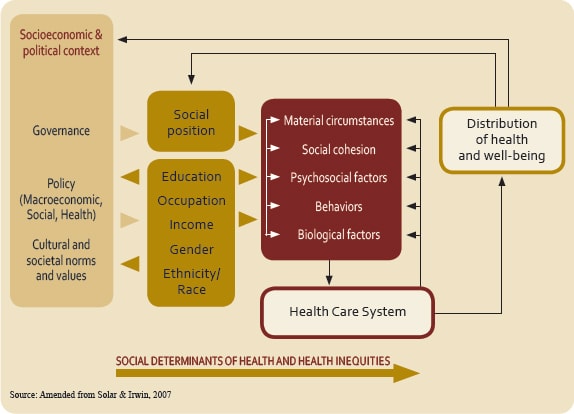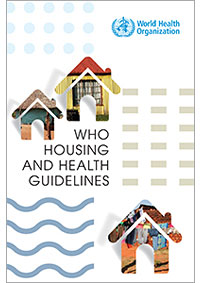The World Health Organization (WHO) created the Commission on Social Determinants of Health to address social determinants of health. The Commission uses the following three principles to guide its work in eliminating health inequities for local communities and nations and throughout the world:

- Improve the conditions of daily life—the circumstances in which people are born, grow, live, work, and age.
- Tackle the inequitable distribution of power, money, and resources—the structural drivers of those conditions of daily life—globally, nationally, and locally.
- Measure the problem, evaluate action, expand the knowledge base, develop a workforce that is trained in the social determinants of health, and raise public awareness about the social determinants of health.
The commission created the conceptual framework below that describes relationships among individual and structural variables. The framework represents relationships among variables that are based on scientific studies or substantial evidence. The framework provides a point from which researchers can take action, such as creating targeted interventions, on social determinants of health.
See also Social Determinant in Health, that WHO refers as a health inequities.
Now it comes the INNOVATIONS linked to IoT- wearables- small data and Health 4.0 in general. In other word: “Innovations that work on a problem that is worth to be solved”. I list you in here, ten of the problems that are worth to be solved and are not even considered in the clasical evidence based medicine but that can be addressed with RLE (Real Life Evidence) :
1.- Avoid overmedication in old frailed people which homeostasis is pending of a thread.
2.- Avoid strong medication and high dosis in situations related with age-social-nutritional factors.
3.- Respect individual feelings and prevent relapses, detecting them in advance.
4.- Avoid stress and suffer associate to social circumstances and facilitate own activity.
5.- Assure a minimum healthy environment, including hygiene facilites.
6.- Assure a minimum healthy social interaction, including pets.
7.- Facilitate movility problems
8.- Create a friendly environment, including plants.
10.- Organize dayly habits, including cooking.
This is address in the Humanization of Healthcare vision taking care without disturbing individuals followed by PHAs (personal health assistants).
UN also face the problem in the YOLS (Year of Living sustainability).


